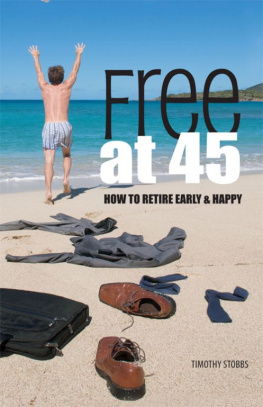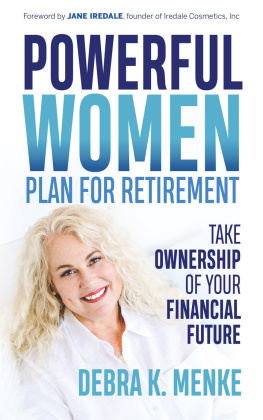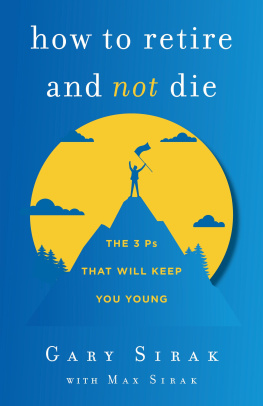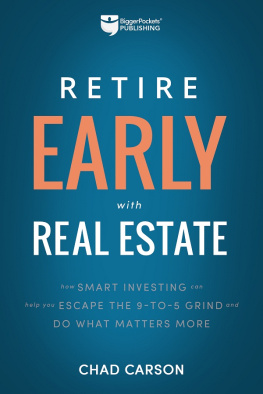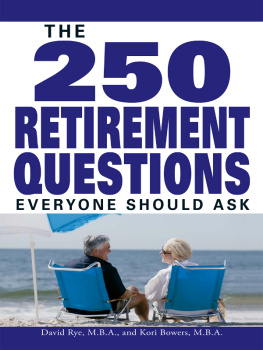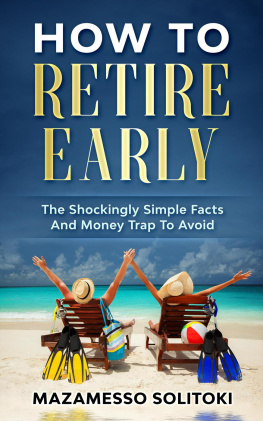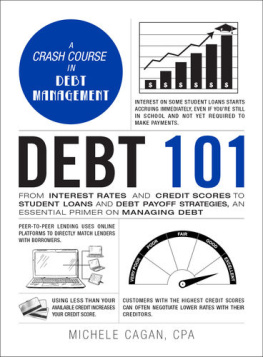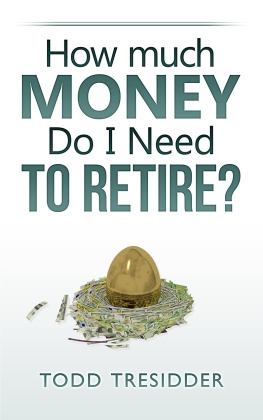Free at 45
How to Retire Early & Happy
Timothy Stobbs
Published by Flatland Publishing Company atSmashwords
Copyright 2011 Timothy Stobbs
All rights reserved.
This ebook is licensed for your personalenjoyment only. This ebook may not be re-sold or given away toother people. If you would like to share this book with anotherperson, please purchase an additional copy for each recipient. Ifyoure reading this book and did not purchase it, or it was notpurchased for your use only, then please return toSmashwords.comand purchase your own copy. Thank you for respecting the hard workof this author .
Library and Archives Canada Cataloguing inPublication
Stobbs, Timothy, 1978
Free at 45 [electronic resource] : how toretire early & happy / Timothy Stobbs.
Includes bibliographical references.
Type of computer file: Electronic monographin PDF format.
Issued also in print format.
ISBN 978-0-9868131-1-5
1. Retirement income--Planning. 2. Earlyretirement.
3. Finance, Personal. I. Title. II. Title:Free at forty-five.
HG179.S745 2011a 332.024'014C2011-900409-7
This publication contains the opinions andideas of the author and is not meant to provide a basis of actionfor any particular situation without the consultation of acompetent professional. It is sold with the understanding that theauthor and the publisher are not engaged in rendering legal,accounting, taxation, financial planning or other professionaladvice, and the author and publisher expressly disclaim anyliability, loss or risk, personal or otherwise incurred as a director indirect consequence of the use or application of the contentsof this book. Neither the author nor the publisher is responsiblefor any errors or omissions within the text. By purchasing thisbook you fully accept these conditions.
To Rhea, for believing in dreams and helpingme reach mine.
Table of Contents
I hate my job, I said to my wife one day in2001.
At first, she assumed Id had a bad day atthe office. No, I explained its more like I hate my job with apassion. My clients are arrogant and over-demanding, the hours areway too long for the pay and my bosses are self-absorbed pricks. IHATE my job!
Thus was born my interest in financialindependence and early retirement. The concept of never having towork for anyone ever again had a lot of appeal at that point in mylife. I cant tell you the number of times I fantasized abouttelling either my clients or my bosses to take that job and shoveit!
So I began reading lots of personal financebooks and talking to older friends and family about retirement.Now, despite my belief that retirement should make you happy, I wasshocked to find out that for about 30% of Canadians retirementwasnt what they expected.[] Some missed their jobs or got bored butthe simple fact was they werent happy.
I left that job since it was making memiserable, but I had nothing lined up afterwards. My income waszero. Despite being a bit worried about money, I was happy. I meanreally happy for the first time in months. Thats when Idecided that it doesnt matter what they pay you, if you hate yourjob, it isnt worth it. So I made a rule: I must always like somepart of my job. If I dont, I must find another one. Life is tooshort to be miserable just for the sake of some numbers in a bankaccount.
And so my interest in the science behindhappiness and what makes people happy grew. I promised myself thatwhen I retired (early!), I would be different. I would be happytoo.
For decades the formula for retirement hasbeen the same: go to school, get a job, work until youre in your60s or older, then finally retire and enjoy your golden years.The problem is that people save up for their entire lives for abrief period of happiness when they are too old to enjoy it. Sorather than trying to fix the formula, Im going to show you how toheave the formula out the door and redesign your retirement andyour life to achieve two things: financial freedom and happiness.Not just in your golden years but starting right now.
Strangely, financial freedom and happinessdont automatically go hand in hand. People just assume that onceyou hit retirement you should be happy. As I discovered whentalking to retirees, this just isnt true. Still, in all thosecommercials everyone looks happy on their sailboats or at the hugefamily cottage at the lake. Reality is a bit different.
Retirement for the first few months is great.You sleep in, play golf, read, do crafts, visit friends and enjoythe money youve saved up. Dissatisfaction creeps in slowly. Yourhobbies start to become a bit boring. You feel anxious andrestless. You begin to doubt yourself. Did I do the rightthing? People often plan their retirement down to the lastpenny, yet they forget to plan what they will do with those twothousand extra hours a year that used to be taken up by theirjobs.
Because of that lack of planning, retireesoften find themselves without direction shortly after retirement.They begin to learn that happiness in retirement isnt a scene in acommercial but rather an ongoing journey that takes just as muchplanning as their finances. Retirement isnt a destination butrather a transitionfrom a life of working to pay the bills to oneof unlimited options. In some cases, people havent experiencedthat much freedom since childhood, so they have literally forgottenhow to live with it.
In order to properly plan out your retirementwe are going to examine both sides of the issue. I want you to beable to retire up to a couple of decades earlier than the norm andto be happy after you do. Ambitious? You bet, but if youre goingto dream, you might as well dream big. The idea is to determinewhere you are now and where you want to be, and then get you thereas quickly as possible, making sure you enjoy the ride to yourretirement as well as the years beyond.
Oddly enough, youll find that saving moremoney for retirement might not actually be required. Despitenumerous attempts by governments and others, shoving money at aproblem doesnt mean it actually gets solvedit often just makesthings worse. So dont assume that if you dont have a lot of moneyyou cant retire early as well. There are options.
Another factor in all of this is that thevery nature of retirement itself has changed in the last few years.Completing your career at the age of 65 and filling your life withhobbies until you die does happen, but not for a lot of people now.Some people work part-time in retirement while others start smallbusinesses. With retirement at 65 no longer mandatory and peopleliving longer lives, the options for your retirement have explodedas more and more people find out what works for them.
There are more ways to get to your retirementthan one book can hope to cover; Ive simply interviewed manyretirees, found out what worked for them and incorporated theirideas into this book.
Id love to hear your thoughts, too. Pleasejoin the conversation on my blog: http://blog.canadian-dream-free-at-45.com .
Turn the page and lets get started!
1 S. Brown.The TD North American Report on Retirement. Toronto: TD Bank.http://www.tdretirement.com/retirementreport/TD%20North%20American%20Report%20on%20Retirement%20final.pdf.Accessed December 2010.
Before we set off down the road to your earlyretirement, ask yourself: Why do I want to retire early?After all, it doesnt do much good to do all this work only torealize in the end it isnt what you really want. Retirement isoften seen by many working people as the great goal of their lives.So overwhelmed are they in their working lives that the idea ofdoing nothing sounds like heaven. Yet if youre not careful thedream of retirement can become a nightmare in which you findyourself with too much empty time on your hands.
Do you want to have more time to follow yourdreams or do you just want to escape your current job? If yourmotivation is to have time to follow your dreams, early retirementis likely going to be a positive experience for you. If, however,you want to escape your current work environment, retirement mayvery well backfire on you. It pays to be realistic in planning forthe future.

